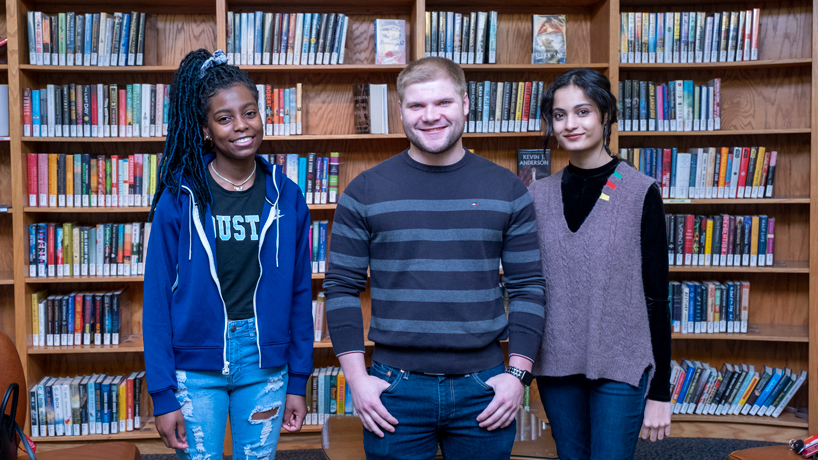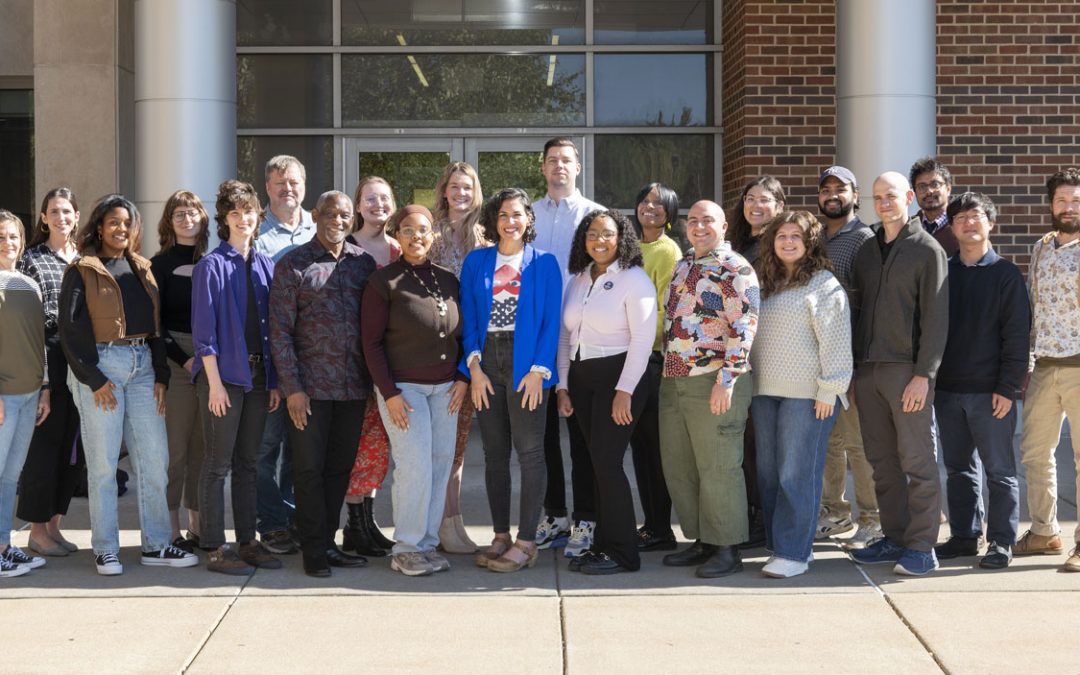
Students (from left) Shawanda Martin, Zachary Weiss and Hufsa Siddiqui have spent the semester working as interns at Decipher, a St. Louis-based company that assists large and midsize law firms in gathering intelligence and doing due diligence in the hiring process. (Photo by August Jennewein)
Some might have been overwhelmed by the scale of the project but not Shawanda Martin.
The University of Missouri–St. Louis student had been tasked with assembling and formatting a data set of some 65,000 different job moves made by lawyers across the United States in 2021.
It was only one of the assignments she’s undertaken over the past two months while serving in a data analyst internship position at Decipher Investigative Intelligence, a St. Louis-based company started in 2016 that assists large and midsize law firms in gathering intelligence and doing their due diligence in the hiring process.
“I’ve been cleaning the data, deleting duplicates and combining them, finding out missing information,” Martin said. “Once I finished with that, the intelligence analysts will be able to go back and look to see which firm had more lawyers come in or which firm had more lawyers leave, or if a news reporter wanted to know something about the firm, they’d have that information as well.”
Martin, a junior majoring in math with an emphasis in data analysis, has been in her element doing the work.
“It’s a cool job,” Martin said. “You’re basically doing research. I like to do research. I like to find things out. It also ties into math because sometimes data analysts have to do research to solve these different problems, complex problems, and I love math.”
Martin is one of three UMSL students Decipher has hired to internships this semester. She and junior physics major Zachary Weiss have been working as data analysts while senior criminology and criminal justice major Hufsa Siddiqui has been serving as an intelligence analyst for the company.
Will Werner, the director of the UMSL Geospatial Collaborative, helped facilitate the internships with Decipher. He’d known Decipher Investigative Intelligence CEO and Founder Michael Ellenhorn and Chief Financial Officer Lara Glauber from his tenure working as a planner and analyst with the St. Louis Metropolitan Police Department.
One of Werner’s priorities when he assumed his current role leading the Geospatial Collaborative was to build connections with local businesses involved in geospatial and intelligence work in hopes that they might provide learning and training opportunities for UMSL students. He reached out to Ellenhorn and Glauber and had lunch last summer.
“It became very quickly focused in on that as someplace we could help out,” Glauber said. “Will talked about the National Geospatial-Intelligence Agency and the new office in St. Louis. That’s where students want to work. One of the big hindrances to that is that they need experience. It’s difficult to get them the type of experience that they need in order to get those jobs. From his perspective, they don’t even have to have specific NGA experience. They have more broad investigative intelligence or investigative experience. We were like, “We can we can offer that.’
“We are always looking for ways to deepen our relationship with St. Louis and also looking for ways to get a talent pipeline, especially today, when hiring is so challenging.”
Glauber, who earned a master’s in accounting at UMSL in 2020, held a virtual information session about an internship opportunity last fall with students from a variety of majors and began accepting applications. About 15 students applied for the intelligence analyst position that Siddiqui received.
But as Glauber and her colleagues reviewed all the candidates, they realized some could fit into other roles.
“Based on the caliber and quality of students that we were seeing from UMSL, we were like, ‘Oh, wow, we have more opportunities here. We can bring on bring on someone else to fill an additional need for us,’” Glauber said.
Martin and Weiss were offered positions as data analysts.
All three interns started their positions on Jan. 10, though they had a chance to start meeting their new colleagues and each other when they attended a company Christmas party a few weeks earlier at Top Golf.
“All the personnel and staff have been very warm and welcoming,” Siddiqui said.
The interns have been working between 20-30 hours each week with flexibility around their class schedules, and their supervisors have all stressed that their school responsibilities should come first.
After a week of training, the interns were turned lose to handle individual projects, though their supervisors have been accessible to help with any questions that have arisen.
“They are a rapidly growing company,” Weiss said. “They’re still very young, so they need the help. They’re not just giving us cookie-cutter, intern-type projects. They’re giving projects that they actually need done. We’re actually working for them, which I absolutely love.”
“I create these reports that I show to my coordinators, and that kind of solidifies the work I’m doing, so that feels good,” Siddiqui said. “I feel like there’s so much that I’m learning.”
Decipher is just as much a beneficiary.
“I think it’s incredibly valuable for the company,” Glauber said. “We’ve been busy. The first quarter of the year is always our busiest, so having that additional resource is incredibly helpful to us. The quality of their work has been fantastic.”
She and her colleagues are already making plans to have summer and fall interns from UMSL as well. They’re scheduling another virtual information session on April 14.
Glauber also said there could be opportunities for the current interns to keep working for the Decipher, either as interns or in full-time positions after they graduate.
Weiss, for one, is interested.
“Absolutely,” he said. “I do think this is something I could see myself settling in and starting my career here if the opportunity presents itself. It also gives me some incentive to try and work hard, so I can keep being asked to come back. I would absolutely love if I could keep interning and working for them until I graduate. It’d be a good way to go through the rest of college while being able to support myself.”














